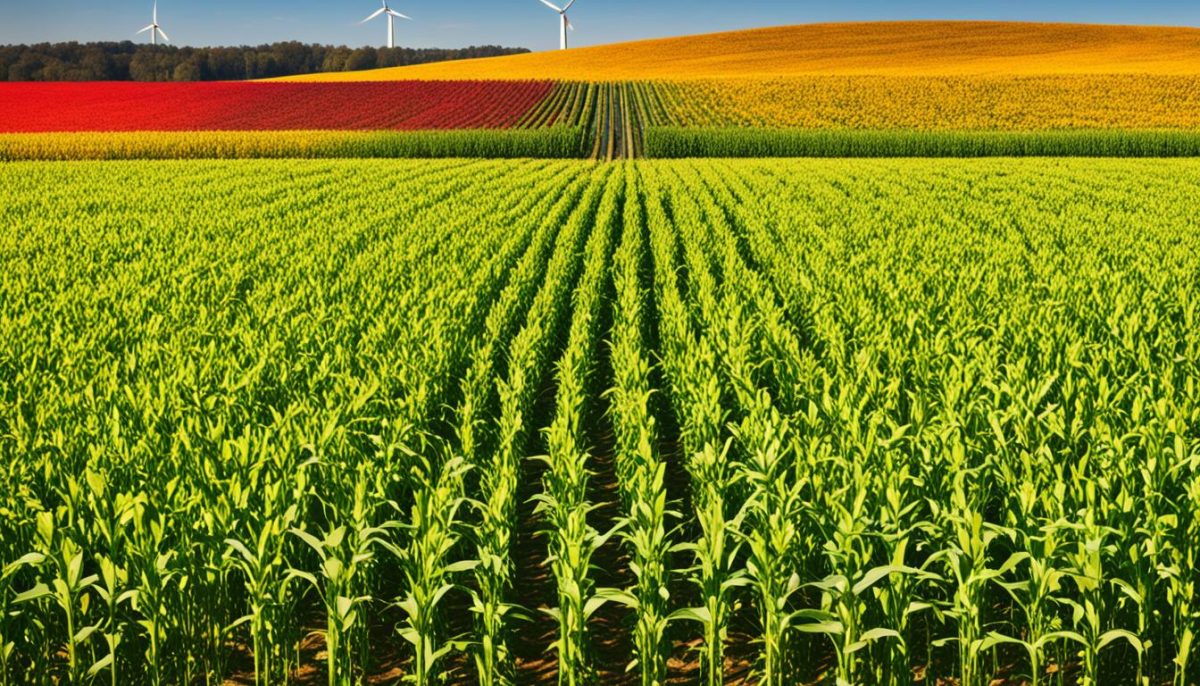Welcome to our article exploring the distinctions between biofuels and alternative fuels. As the world strives to transition to cleaner and more sustainable energy sources, understanding the differences between these two forms of energy is crucial. Both biofuels and alternative fuels offer promising solutions in the pursuit of a greener future.
In this article, we will delve into the definitions, sources, and environmental impacts of biofuels and alternative fuels. By examining their unique properties and benefits, we aim to provide you with a comprehensive understanding of these clean energy options.
So, let’s begin our exploration of biofuels and alternative fuels and discover how they can contribute to a more sustainable and environmentally-friendly energy landscape.
Understanding Biofuels
In this section, we will delve into the world of biofuels and explore their significance in the realm of renewable energy. Biofuels are derived from organic matter such as crops, vegetable oils, and animal fats, making them a sustainable alternative to traditional fossil fuels.
Sources of Biofuels
Biofuels are sourced from a variety of materials, including:
- Corn and sugarcane
- Vegetable oils such as soybean, palm, and canola
- Animal fats
- Algae
These sources contain energy stored through photosynthesis, making them valuable resources for renewable energy production.
Types of Biofuels
Biofuels can be categorized into two main types:
- First-generation biofuels: These are made from edible crops and food sources, such as corn, sugarcane, and vegetable oils.
- Second-generation biofuels: These are derived from non-food sources, such as agricultural waste, algae, and dedicated energy crops. They are considered more sustainable and environmentally friendly compared to first-generation biofuels.
The development of third-generation biofuels, such as algae-based biofuels, is also underway to further enhance the sustainability and efficiency of biofuel production.
Benefits and Drawbacks of Biofuels
Biofuels offer several potential benefits:
- Reduced carbon emissions: Biofuels have lower carbon emissions compared to fossil fuels, contributing to efforts to mitigate climate change.
- Renewable energy source: Since biofuels are derived from organic matter, they provide a renewable energy option that can help reduce dependence on finite fossil fuel reserves.
- Domestic production: Biofuel production can enhance energy security by reducing reliance on imported oil.
However, there are also drawbacks to consider:
- Land and water usage: The production of biofuels may require significant land and water resources, potentially impacting ecosystems and food production.
- Competition with food production: The use of edible crops for biofuel production can create competition with food production, leading to rising food prices.
- Indirect land-use change effects: The cultivation of biofuel crops may result in land-use changes that have indirect environmental impacts.

| Biofuel Type | Advantages | Disadvantages |
|---|---|---|
| First-generation biofuels | – Utilizes existing infrastructure – Can be blended with conventional fuels – Reduces greenhouse gas emissions |
– Competes with food production – May require large amounts of water – Can lead to deforestation |
| Second-generation biofuels | – Derived from non-food sources – Reduces reliance on food crops – Lower carbon emissions |
– Requires advanced production techniques – Limited commercialization – High production costs |
By acknowledging both the benefits and drawbacks of biofuels, we can make informed decisions about their role in our pursuit of clean energy sources and reduced carbon emissions. The next section will focus on alternative fuels and how they compare to biofuels.
Unraveling Alternative Fuels
In the quest for cleaner energy options, alternative fuels have emerged as promising alternatives to traditional non-renewable energy sources. These fuels offer a significant reduction in greenhouse gas emissions and aid in the transition towards a more sustainable future. In this section, we will delve into the world of alternative fuels, exploring their sources, advantages, and limitations.
What are Alternative Fuels?
Alternative fuels are energy sources that offer a greener and more sustainable alternative to non-renewable fuels such as gasoline and diesel. Unlike biofuels, which are derived from organic matter, alternative fuels come from a variety of sources, including natural gas, hydrogen, and electricity. These fuels are considered alternative because they provide a viable and more environmentally friendly option for powering vehicles and machinery.
Sources of Alternative Fuels
Alternative fuels can be obtained from diverse sources, each with its unique characteristics and benefits:
- Natural Gas: Natural gas is a fossil fuel alternative that produces lower greenhouse gas emissions compared to gasoline and diesel. It is primarily extracted from underground reservoirs, offering a cleaner burning fuel for transportation and other applications.
- Hydrogen: Hydrogen is a clean and abundant element that can be used as an alternative fuel. It can be produced from various sources, including natural gas, biomass, and electrolysis of water, offering a versatile and renewable energy option with zero greenhouse gas emissions.
- Electricity: Electricity serves as an alternative fuel when used to power electric vehicles (EVs) and hybrid electric vehicles (HEVs). It is generated from diverse sources such as wind, solar, hydro, and geothermal power, offering a renewable and sustainable option for transportation.
Benefits and Limitations of Alternative Fuels
Alternative fuels present several advantages in terms of reducing greenhouse gas emissions and dependence on non-renewable energy sources. By utilizing these fuels, we can achieve a significant reduction in carbon dioxide (CO2) and other harmful emissions, contributing to cleaner air quality and mitigating the impact of climate change. Furthermore, the use of alternative fuels can help diversify our energy sources, reducing our reliance on imported oil and enhancing energy security.
However, alternative fuels also have limitations that need to be considered. The infrastructure required to produce, distribute, and store alternative fuels can be costly and may require significant investments. In addition, the availability and accessibility of alternative fueling stations may be limited in some regions, hindering the widespread adoption of alternative fuel vehicles.
To illustrate the impact of alternative fuels on reducing greenhouse gas emissions and combating climate change, refer to the chart above. It highlights the significant difference in emissions between alternative fuels and traditional non-renewable fuels. By embracing alternative fuels, we can substantially reduce our carbon footprint and move towards a more sustainable future.
Comparing Biofuels And Alternative Fuels
Now that we have explored the details of biofuels and alternative fuels, it’s time to compare and contrast these two clean energy options. One of the key differences lies in their sources. Biofuels are derived from organic matter such as crops, vegetable oils, or animal fats, making them renewable energy sources. On the other hand, alternative fuels encompass a wider range, including natural gas, hydrogen, and electricity, but they are generally derived from non-renewable sources.
The production processes of biofuels and alternative fuels also vary. Biofuels require the conversion of organic matter through processes like fermentation or transesterification. In contrast, alternative fuels often involve extraction or transformation from their primary sources. While both types have their own challenges and limitations, biofuels generally have a smaller carbon footprint and lower greenhouse gas emissions compared to certain alternative fuels.
When considering the environmental impact, biofuels have a more positive outlook. They contribute to reducing the carbon footprint, as the carbon dioxide emitted during their combustion is recaptured by the plants during their growth. Additionally, biofuels help in minimizing air pollutants, which is beneficial for urban areas and improving air quality. Alternative fuels, although cleaner compared to conventional fossil fuels, may still have varying levels of emissions and environmental impact depending on their specific sources and production methods.
In terms of energy sustainability, both biofuels and alternative fuels play a crucial role. Biofuels offer a renewable option to replace fossil fuels in transportation and other energy-consuming sectors. They can help reduce dependence on depleting fossil fuel reserves while promoting a more sustainable energy mix. Alternative fuels, on the other hand, provide diversification and innovation in the energy sector, with the potential to create a more sustainable and resilient energy future.

